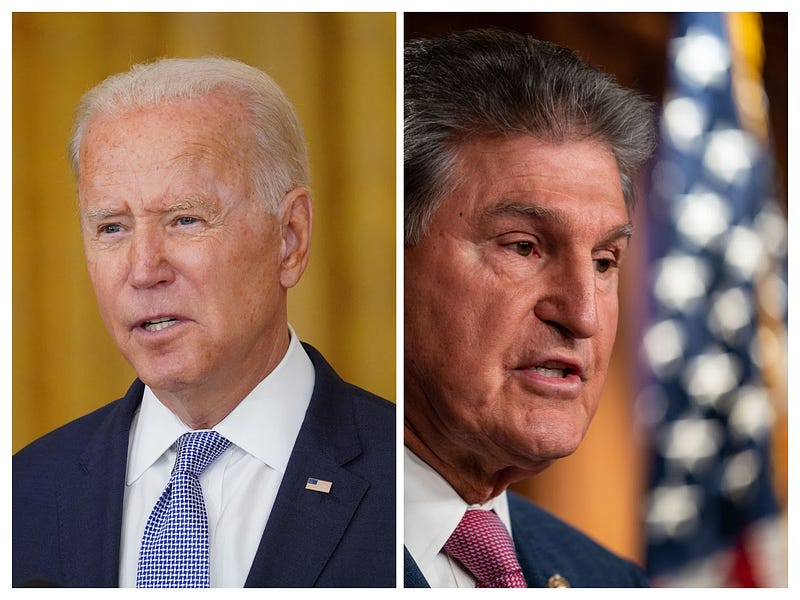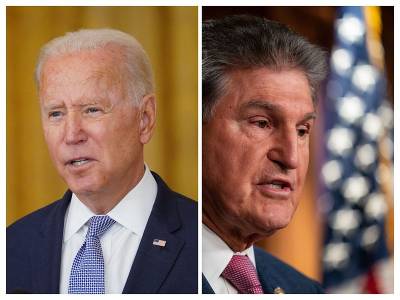The wall-to-wall coverage of progressive carping about Joe Biden has been interrupted by reruns of progressive carping about West Virginia Sen. Joe Manchin.
Last week, in the wake of horrible inflation numbers, Manchin said, in effect, “I’m out” on President Biden’s climate, energy, and tax package. Because the Senate is split 50-50, that means it’s effectively dead for the foreseeable future since no Republican is likely to go along with it. Manchin didn’t say he’d never vote for it, but he wants to pass a prescription drug bill first. Since there’s no room on the legislative calendar before the midterms—which will scramble everything anyway—the package is at best on indefinite hold.
Democrats, especially the progressives, are vexed. The founder of the Center for American Progress, John Podesta, a former top aide to President Obama, declared that Manchin chose “as his legacy to be the one man who single-handedly doomed humanity.” On Sunday, Sen. Bernie Sanders told ABC’s Martha Raddatz that his Senate colleague “has sabotaged the president’s agenda.” Sanders pointedly added that he’s been warning people that the sabotage was intentional in part because Manchin’s been in the pocket of the fossil fuel industry all along.
Whatever the merits of this familiar criticism of Manchin may be, one thing is fairly obvious: The critics have his motivations wrong. I’m no mind-reader, but I’m fairly confident that the West Virginia senator doesn’t want to be remembered as the man who doomed humanity. As for wanting to sabotage the president’s agenda, that’s certainly more debatable. But Sanders’ framing obscures the fact that what he really means to say is Manchin is undermining Sanders’ agenda.
Of course, it’s not just Sanders’ agenda. But Sanders speaks for the progressives who are increasingly pushing the national Democratic Party left. And that’s the fundamental flaw in all of the criticism of not just Manchin but Biden as well.
In recent weeks, progressive complaints about Biden have been about his ineffectiveness or incompetence—not his ideology. No one would be griping about Biden’s age or poor messaging if he were getting stuff done.
A failure to follow through on the Democrats’ agenda is what’s making them angry. As Bloomberg’s Ramesh Ponnuru writes: “Biden has always been close to the center of his party. Unsurprisingly, then, the basic political mistakes of his presidency have been party-wide ones.”
In other words, the conversation about the staggering political headwinds the Democrats are facing ignores the possibility that the party itself is the problem. Biden wasn’t bucking his party when he pulled out of Afghanistan. He wasn’t freelancing with his lavish spending proposals or his denunciations of Republicans as representing “Jim Crow 2.0” for being against his party’s proposed electoral reforms. Nor was he going rogue with his proposed revisions to clarify that Title IX guidelines extend to sexual orientation and gender identity
Hence the irony. Manchin is hugely popular with his voters because he’s bucking not merely “the president’s agenda” but the Democrats’ agenda, while support for Biden has cratered by sticking to that agenda—despite his inability to get much of it enacted because it’s not sufficiently popular.
Obviously, if he were racking up more legislative wins, Biden would be less unpopular. But one of the primary reasons he’s failing is that his agenda, and his rhetoric, caters to a progressive base that speaks for a minority of voters.
Democrats kept pushing massive spending even as inflation proved to be anything but transitory. Manchin opposed that spending because he feared its inflationary effects. Manchin won that policy argument, but Democrats like Sanders pretend Manchin is simply a party wrecker. Sure, Manchin is cozy with the fossil fuel industry, but you know what voters want? Cheaper fossil fuels.
One needn’t argue that everything Democrats want to do is unpopular, but neither is it the sole representative of the popular will—or even the collective will of rank-and-file Democratic voters. According to a recent Monmouth University poll, the top four issues for voters are all variations on the same theme: inflation (33 percent), gas prices (15 percent), the economy (9 percent), everyday bills (6 percent). After that it’s “abortion, reproductive rights” at 5 percent and “guns, gun ownership,” at 3 percent (the January 6 riot, packing the Supreme Court and transgender issues don’t even make the list).
I get the sincere and principled concern over issues like climate change and abortion rights. But if you listen to progressive legislators—usually holding extremely safe seats—and to party activists like Podesta, you’d think that they’re looking at polling data from a very different electorate than the one that actually exists.
The harsh truth for progressives: Most voters just aren’t that into you.







Please note that we at The Dispatch hold ourselves, our work, and our commenters to a higher standard than other places on the internet. We welcome comments that foster genuine debate or discussion—including comments critical of us or our work—but responses that include ad hominem attacks on fellow Dispatch members or are intended to stoke fear and anger may be moderated.
With your membership, you only have the ability to comment on The Morning Dispatch articles. Consider upgrading to join the conversation everywhere.